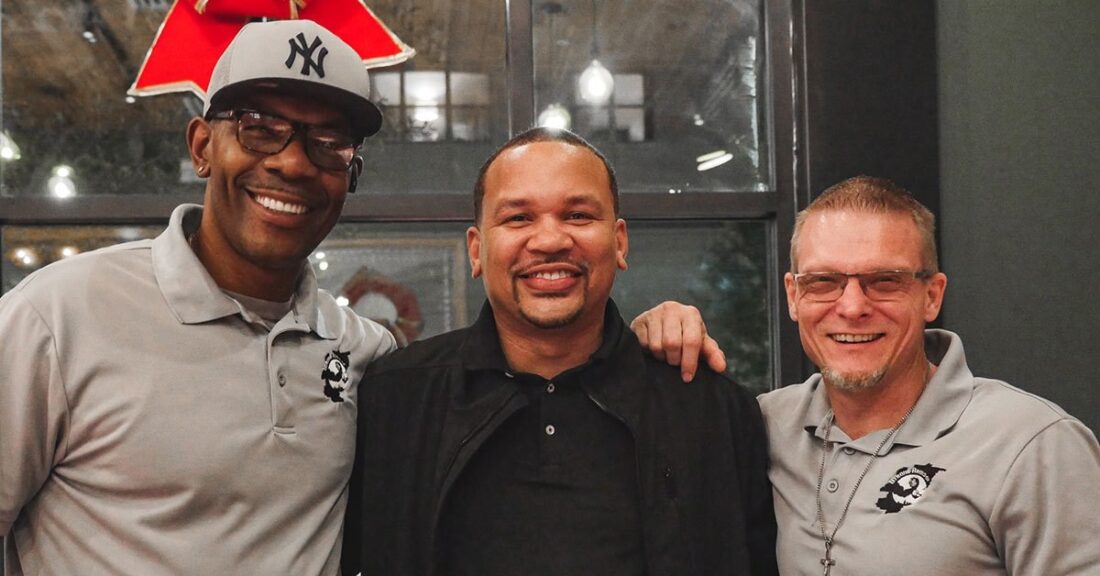In Mississippi, Credible Messengers Promote Community Safety and Youth Success

From left: Strong Arms of JXN's John Knight, Terun Moore and Benny Ivey
A program called Strong Arms of JXN is working with young people to reduce community violence in Jackson, Mississippi.
Launched in 2018, the initiative relies on credible messengers — people with life experience and strong community ties — to mentor youth and steer them away from destructive behaviors and crime. It’s is one of several Jackson-based community groups supported by the People’s Advocacy Institute, an Annie E. Casey Foundation grantee.
Read about the Strong Arms of JXN in the Jackson Free Press
“The city of Jackson exemplifies community partnership and the ecosystem necessary to support violence reduction strategies,” says Burgundi Allison, a program associate within Casey’s Center for Civic Sites and Community Change.
Interrupting a Cycle of Violence
In Strong Arms of JXN, formerly incarcerated adults use what they’ve learned to help youth avoid making the same mistakes. The program itself has two main objectives: 1) keep young people from dropping out of school; and 2) keep young people away from negative interactions with law enforcement. Both scenarios are precursors to later criminal activity, research indicates.
Strong Arms of JXN’s Co-director Benny Ivey and adult mentor John Knight share pasts scarred by drug and gang activity. After exiting prison, Knight got his life back on track and grew determined to dissuade young people from following in his earlier destructive footsteps.
Keeping Young People in Jackson Schools
In addition to his role with Strong Arms of JXN, Knight works as a peer counselor at Henley-Young Juvenile Justice Center, a local youth detention facility, and as the truancy director for the local youth court. In both settings, he talks with young people to learn about the challenges they’re facing and to share his own story. He leverages school officials — and connects families with needed resources — en route to helping youth redirect their lives without police involvement.
“My job is to get all the information from the parents and set up meetings to see why these kids are not going to school, what we can do to help them get into school and what we can do to make them more interested in school,” Knight says. “That’s a battle, but it’s a good battle to fight because, as you are in the process of trying to influence them to go to school, you could teach them things in the same process.”
Partnering With Juvenile Courts
Through Knight’s role as an on-site peer counselor, Strong Arms of JXN has started working with young people at Henley-Young Juvenile Justice Center. Youth Court Judge Carlyn M. Hicks, a vocal advocate of the program, has seen firsthand the group’s ability to reach young people.
“I investigated this credible-messenger program myself,” says Hicks, who remembers feeling “quite pleased,” with Strong Arms of JXN’s approach and impact.
Today, Hicks regularly refers youth to the initiative and notes that violence at Henley-Young has dramatically decreased since the program’s arrival.
Making a Difference for Young People in Jackson
Seven youth have graduated from the program since 2021, and another class is now moving through the standard three-month mentoring period. Most graduates have remained out of trouble in school or with the law, says Ivey.
Jackson Mayor Chokwe Lumumba, whose sister helped introduce credible-messenger approaches in the city in 2016, attended the inaugural class’s graduation ceremony. He liked what he saw.
Aa he surveyed the graduates, Lumumba remembers how he could “see new hope in their eyes, see people looking at them in a different way, hear them speak about how they wanted to be a part of the solution while also recognizing the challenge of what they were up against.”
In the last year, Strong Arms of JXN has organized a work-readiness program called the Dignity Economy Fellowship. Seven participants between the ages of 18 to 25 completed the program, with two members finding full-time employment soon after. “One is driving an 18-wheeler now,” says Ivey.
Strong Arms of JXN Looks Ahead
Strong Arms of JXN’s success has earned it access to the Sykes Park Community Center. The new area will house training opportunities while also giving kids in Jackson a safe space to hang out. Knight and Ivey plan to outfit the location with video game consoles, air hockey tables and even an on-site rap studio — changes intended to spark more socializing among young participants.
The program is also working to address common obstacles that kept past participants from succeeding. For instance: Some youth lacked reliable transportation, which impacted their attendance. Strong Arms of JXN identified this challenge and hired a driver to give young people rides to and from the program.
“We are inspired by the transformative work that grassroots organizations like Strong Arms of JXN are doing with young people,” says Pamela Lawrence, the Casey Foundation’s director of National Community Strategies. “Casey recognizes that, by working with local organizations to tackle the root causes of crime and violence, we can work toward communities that are safer for everyone.”
Learn About Casey’s Commitment to Improving Community Safety






